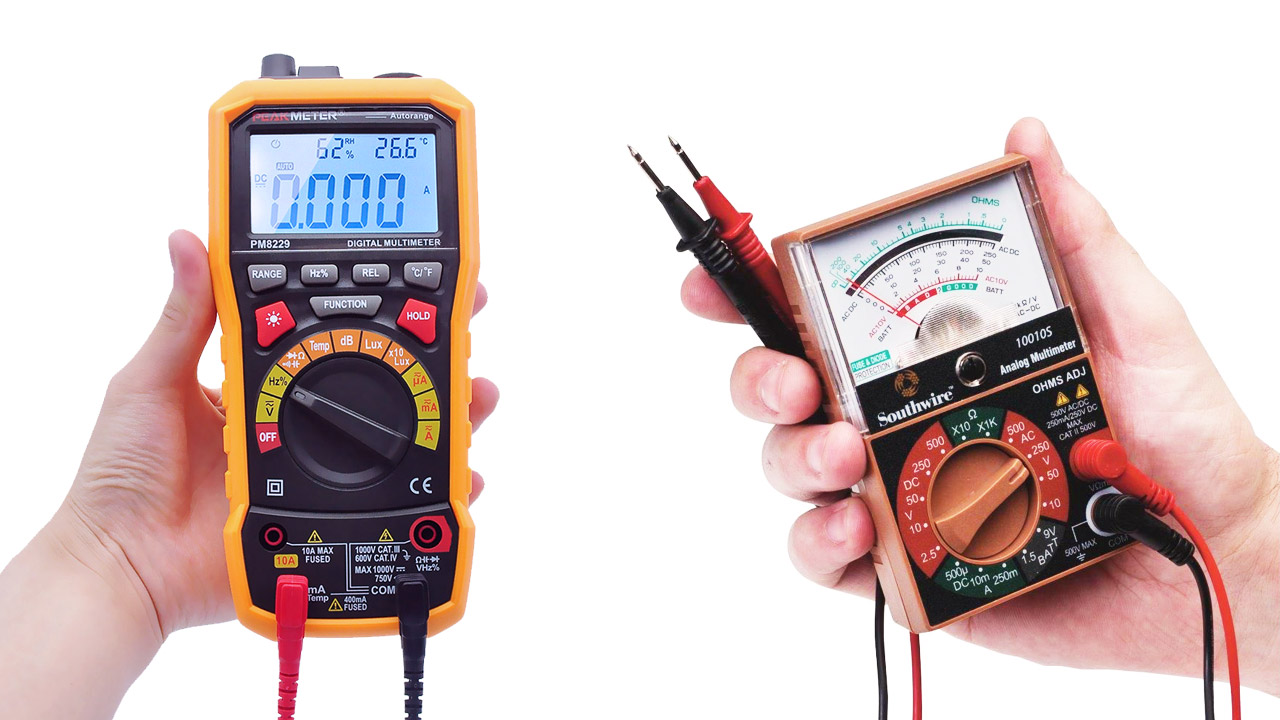When purchasing a multimeter, it can be challenging to choose between the different models and types that are available. Should you choose an analogue or a digital version?
Both analogue and digital multimeters offer a range of helpful functions and benefits for measuring current, voltage, and resistance. There are a few factors that can help you decide which option is the right choice for you.
Here is what you need to know to help you choose between a handheld analogue multimeter and a digital multimeter.
What is the difference between handheld analogue and digital multimeters?
A handheld analogue multimeter is a device used to measure current, voltage, and resistance when completing electrical tasks. Analogue multimeters feature a pointer that is controlled by a magnetic field. This field is affected by changes in electrical currents, causing the pointer to move and indicate electrical magnitude measurements.
A digital multimeter is also used to measure current, voltage, and resistance, but it is more complex in design and application. Digital multimeters feature comparators, encoders, and logic controllers and can show a digital display of measurement results. These multimeters can test additional electrical components, including diodes, transistors, and capacitors.
What performance elements should you consider?
Both analogue and digital multimeters are used for a range of electrical measurement tasks.
Increasingly, digital tools and technologies are becoming a popular choicr, making it easier to read and record important data. In most cases, digital multimeters provide more accurate measurements than their analogue counterparts.
Digital multimeters also provide automatic calibration and can record negative values. Scales are determined by the device and do not have to be set manually. This can make it much easier to conduct fast and accurate electrical measurements.
However, quick measurement speeds can also lead to occasional inaccuracies. Electrical currents change as they flow. If a current fluctuates after a fast initial measurement, the measurement may not be an accurate overall representation.
Analogue multimeters also have important benefits. While digital multimeters require a battery in order to conduct all measurements, handheld analogue multimeters can measure current and voltage without a battery power source.
Handheld analogue multimeters are usually much cheaper to purchase than digital options, making them a good entry-level purchase.
Ultimately, both multimeter options have benefits and deficits, so it’s best to consider your own preferences and measurement needs when making a decision.
What other factors could affect your choice?
When choosing a multimeter, safety should be your first priority. Fortunately, both handheld analogue and digital multimeters are safe to use to measure electrical current, voltage, and resistance.
While analogue multimeters can be helpful, digital multimeters tend to produce more accurate measurement results. This allows for decisions to be made quickly and efficiently to protect materials and individuals.
A high-quality multimeter, whether it is analogue or digital, should allow for a high degree of accuracy when measuring and recording electrical data so as to ensure that all workplace safety rules and regulations are adhered to.
Looking for the right multimeter option? Browse RS Components multimeters online today to find great-quality handheld analogue and digital multimeters!


